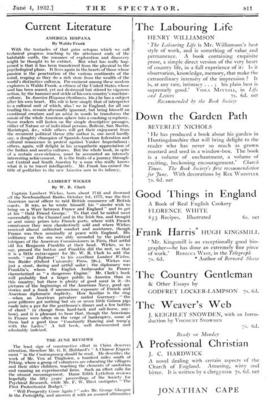Captain Lambert 1Viekes, born about 1742 and drowned off the
Newfoundland Banks, October 1st, 1777, was the first American naval officer to raid British commerce off British coasts. It was, as he wrote himself, his " sincire wish to bring on a Warr between France and England " and to get at his " Oald Friend George."' 'l'o that end he raided most successfully in the Channel and in the Irish Sea, and brought or sent many prizes into French ports, where with French connivance they were clandestinely sold and where Wickes received almost unlimited comfort and assistance, though France was then nominally at peace with England. His militancy on the sea was ably seconded by the political intrigues of the American Commissioners in Paris, that artful old fox Benjamin Franklin at their head. Wickes, so to say, pressed the button and Franklin did the rest, so that it is a little extravagant for Mr. W. B. Clark to add the words " and Diplomat"' to his excellent Lambert 11"iehes, Sea Raider (Oxford University Press, 28s.). Wickes was Fst a stout, daring and artful" sailor ; the diplomacy was ranklin's, whom the English Ambassador to France characterized as " a dangerous Engine:' Mr. Clark's book will probably find a larger public in America than in this country, but there is plenty of good meat in it --its pictures of the beginnings of the American Navy, good spy stories and a frank if unconscious exposure of French and American diplomatic duplicity. How familiar is the ring --when an American privateer raided Guernsey—" the poor pilferers got nothing but six or seven little Guinea pigs made into a pye for the gentlemen's dinner and a few bottles of claret " (a change from hard-tack and salt-horse, any- how), and it is pleasant to hear that, though the Americans in France were often on the verge of bankruptcy, some of them had a good time "Constantly Dancing and minp'g with the Ladys." A full book, well documented and admirably- indexed.




































 Previous page
Previous page